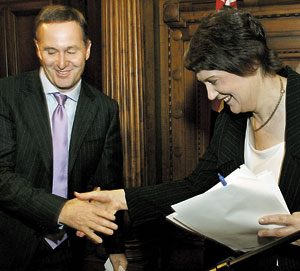I have been unable to sleep at night for fretting about the incarceration of Paris Hilton. How will she endure her 23 days of solitude? And how many thousands may suffer permanent hearing damage on June 5 as her cell door swings shut and a cheer goes up around the globe?
At a dinner in Miami a few weeks ago, starlets Hilary and Haylie Duff reportedly toasted Hilton's sentence. And a member of a rival celeb's camp in LA was heard to crow: "We're all hoping somebody knocks some sense into that bitch when she's there."
Violence. The universally acknowledged but imperfectly-policed dimension of prison life.
Even when you're not being pinned against a wall and tormented, it's no Hilton for a Hilton. Ask an LA criminal defense attorney:
Forty-five days in L.A. County Jail is really rough. That's an awful, hellish place. Conditions are miserable, people take showers under cold dripping water, the food is completely inedible.
Paris, the news reports tell us, has "already received death threats" and is taking self-defence classes. She's also buying books about Buddha, God, and anyone else who might do a better job for her than all the useless help she has on the payroll.
Not that she may need them. "Reports" report that she will be housed in a 'special needs unit' reserved for police officers, public officials, celebrities and 'other high-profile inmates' and she will have a panic device to holler for a prison guard in case she strikes trouble.
I don't wish any physical harm on her. I don't wish physical harm on anyone. But what makes her special? Doesn't every prisoner deserve to be protected from harm in prison?
If you have the capacity to read harrowing material, keep reading. Otherwise stop now. It comes from a Salon story about a Tennessee man who found himself banged up in one of America's toughest jails.
Interviewed at his home, decorated with bright Christmas knickknacks, Liberto chokes back sobs as he remembers the scene.
Two men stood by the cell door. They ordered Liberto to shut up or they would slit his throat. Pull your pants down, they said. One of the men pushed a spoon into Liberto's mouth. "They told me to suck on this spoon, lick it real good," he says, barely able to talk through his sobs. "They bent me over and rammed that spoon in my rectum so hard, ramming it and turning it and shoving it and they said, 'We're getting you ready.' And then they took their penises out and put them in my face and rubbed them on my mouth. I could feel one of them back there. They put a handkerchief or something in my mouth."
The guards announced it was time to lock down the pod again. As the men who had orally raped and sodomized him left his cell, Liberto says that a guard yelled at his assailants, "Did you show that white boy a good time?"
If the State sends someone to prison knowing they may be beaten or raped, and they fail to avert that harm from taking place, are they complicit in the harm? The sentence in court may read "Three years and six months imprisonment", but if the jailers cannot protect that prisoner, should the sentence not actually read "Three years, six months and an unspecified number of beatings, violations and general torment?"


